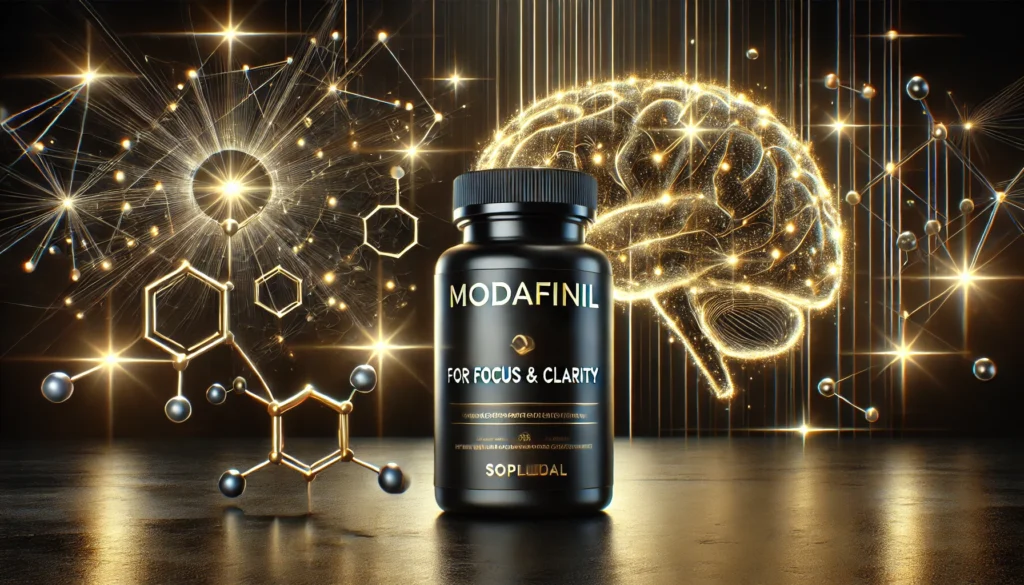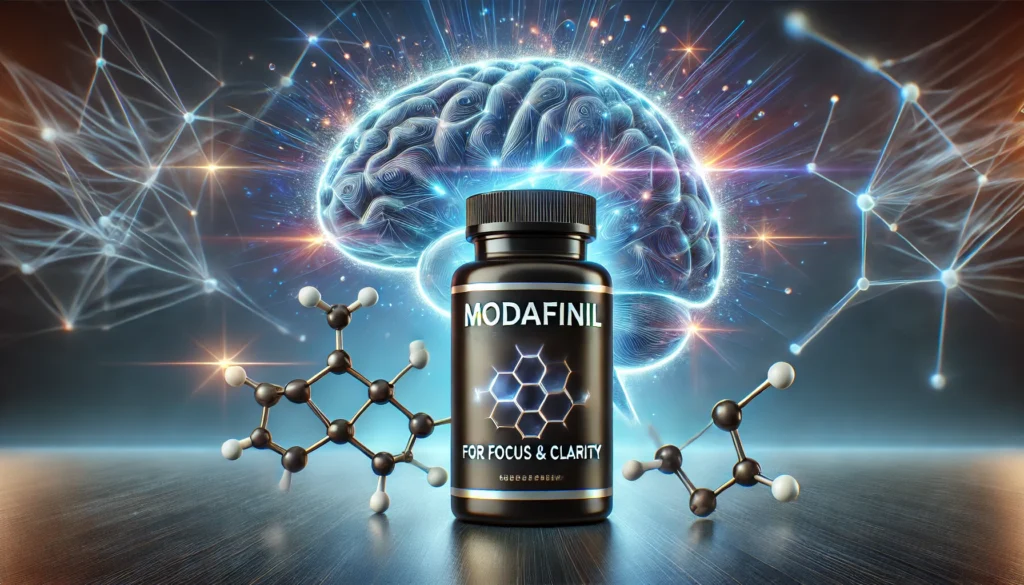The nootropic supplement modafinil has been more well-known recently due to its propensity to improve alertness, focus, and cognition. This article will examine the chemical makeup of modafinil, as well as its advantages for health, the best dosage, any adverse effects, possible drug interactions, and other essential details about how to use this supplement responsibly. Because modafinil requires a prescription, it is crucial to speak with a doctor before taking it to ensure safe and effective use.
You May Also Like:
TIQ: Benefits, Dosage, Side Effects, Drug Interactions, and Other Important Information
Theaflavin: Benefits, Dosage, Side Effects, Drug Interactions, and Other Important Information
Nature of Modafinil
Narcolepsy, sleep apnea, and shift work sleep disorder are among the sleep disorders that are treated using the prescription drug modafinil. It encourages alertness and wakefulness and is categorized as a central nervous system (CNS) stimulant. Because it does not seem to raise heart rate or produce jitters, modafinil is not regarded as a typical stimulant like caffeine or amphetamines. Instead, it is supposed to promote motivation, focus, and cognitive function. Although the FDA has not authorized modafinil’s usage for this purpose, some people use it as a cognitive enhancer or “smart drug” to increase their productivity and mental performance.
Relax Your Mind and Body for Better Sleep with High-Quality Supplements—Buy Today on Amazon!
Health Benefits of Modafinil
The US Food and Drug Administration (FDA) has given modafinil the go-ahead for the treatment of narcolepsy, shift work sleep disorder, and obstructive sleep apnea. Moreover, it is used off-label to treat illnesses like chronic fatigue syndrome, attention deficit hyperactivity disorder (ADHD), and others that are marked by extreme weariness or sleepiness. Modafinil has been researched for its potential to provide cognitive-enhancing effects in healthy individuals in addition to these approved applications. According to research, modafinil may enhance several cognitive processes, including:
- Alertness and Wakefulness: Sleep-deprived and non-sleep-deprived individuals have shown that modafinil increases alertness and decreases drowsiness. This impact benefits for shift workers, service members, and people with sleep difficulties who need to stay attentive throughout their waking hours.
- Attention and Focus: Many studies have shown that modafinil can enhance the attention and focus of healthy individuals and those with ADHD. Those who have cognitive deficits brought on by aging, brain damage, or neurological conditions may potentially benefit from modafinil.
- Memory and Learning: Studies have indicated that modafinil improves working memory, episodic memory, and spatial memory, among other forms. Healthy people and those with cognitive impairments may benefit from these learning and academic performance benefits.7

Chemistry of Modafinil
A synthetic stimulant of the central nervous system (CNS), modafinil (C15H15NO2S) is a member of the benzhydryl sulfinyl chemical class. With a chiral center in the sulfoxide position and a molecular weight of 273.35 g/mol, it possesses two enantiomers: the R-enantiomer and the S-enantiomer. Compared to the S-enantiomer, the R-enantiomer—also known as armodafinil—is pharmacologically more active and has a longer half-life. Modafinil is a white to off-white, crystalline powder insoluble in water and cyclohexane, only marginally soluble in acetone, and soluble in methanol.
Physiological Mechanism of Action
Modafinil’s precise mode of action is unknown, but it is thought to include several neurotransmitter systems. By attaching to the dopamine transporter (DAT) and preventing dopamine reuptake, modafinil appears to increase dopaminergic transmission by raising extracellular dopamine levels, which has comparable effects to other psychostimulants like amphetamines and methylphenidate in that it increases alertness and wakefulness.
Modafinil has been demonstrated to affect the dopamine and norepinephrine, serotonin, glutamate, and gamma-aminobutyric acid (GABA) systems. These interactions raise cortical excitability and arousal, contributing to the drug’s reported cognitive-enhancing effects.

Optimal Dosage of Modafinil
The correct modafinil dosage depends on both the patient’s reaction to the medicine and the specific indication for which it is being administered. For individuals with narcolepsy or obstructive sleep apnea, a starting dose of 200 mg per day, administered as a single dose in the morning, is often advised. The recommended dose for shift work sleep disturbance is 200 mg, administered about an hour before the start of the work shift.
Lower doses might be necessary for off-label usage, including cognitive improvement in healthy adults. Studies have shown that dosages between 100 and 200 mg can offer noticeable cognitive benefits without having a substantial negative impact. Even at lesser doses, speaking with a medical expert before using modafinil is essential to guarantee its suitable and safe use.
Side Effects of Modafinil
Although most people tolerate modafinil well, some people may develop negative effects. The most frequent adverse reactions include headache, nausea, lightheadedness, and sleeplessness. These side effects are usually minor and go away independently or after a dose modification. More severe adverse effects from modafinil are possible but less frequent. They include:
- Hypersensitivity responses: Modafinil has occasionally been linked to severe skin reactions such as Stevens-Johnson syndrome and toxic epidermal necrolysis. When a rash or other hypersensitivity symptoms appear, stop taking the drug immediately and go to the doctor.
- Cardiovascular effects: Modafinil may increase blood pressure and heart rate, especially in people with cardiovascular disease. Therefore, it is advised that blood pressure and heart rate be regularly checked for those on modafinil.
- Psychiatric problems: Modafinil may result in or aggravate psychiatric symptoms such as mania, psychosis, agitation, or anxiety. When taking modafinil, people with a history of psychiatric illnesses should be properly watched.

Potential Substance Interactions with Modafinil
Modafinil may interact with some other drugs, which could reduce their effectiveness or raise the possibility of adverse side effects. These are a few notable interactions:
- Hormonal contraceptives: Modafinil may lessen their efficacy, raising the risk of unwanted pregnancy. When taking modafinil, alternative or extra forms of contraception should be taken into account.
- antidepressants: Modafinil may interact with tricyclic and selective serotonin reuptake inhibitor (SSRI) antidepressants, possibly increasing adverse effects or decreasing antidepressant effectiveness.
- Anticoagulants: Modafinil may increase the likelihood of bleeding in people using anticoagulants like warfarin. Altering the anticoagulant dose and closely monitoring anticoagulant levels may be essential.
- Substrates for the CYP450 enzyme: Modafinil stimulates the CYP3A4 enzyme, which is involved in the metabolism of several drugs. Modafinil may lower the blood levels of drugs processed by this enzyme, reducing their effectiveness.
Inform your healthcare provider about all the medications and supplements you are taking to reduce the possibility of harmful interactions.

Best Responsible Uses of Modafinil
Understanding the potential advantages and disadvantages and recommended modafinil dosage for responsible use. You should also speak with a healthcare provider before beginning treatment. Observe these recommendations to guarantee the best results:
- Get a prescription: As modafinil requires a prescription, only qualified medical personnel should use it.
- Begin with a small dose: To reduce the risk of adverse effects, start with the lowest effective dose and increase it as needed. This method also helps determine the correct dosage to achieve the desired cognitive impact.
- Watch for side effects: If you experience any, alert your healthcare provider. In some circumstances, changing the dosage or stopping the drug may be essential.
- Prevent combining with other substances: To reduce the chance of interactions, let your doctor know about all your drugs and supplements. Also, refrain from using any stimulants or other medications that might interact with modafinil.
- Give sleep hygiene a priority: Although modafinil might lessen the consequences of sleep deprivation, it cannot replace restful sleep. Ensure you continue practicing an excellent sleep routine, including a regular sleep schedule, maintaining a sleep-friendly environment, and avoiding stimulants right before bed.
- Modafinil should be combined with other cognitive enhancement techniques, such as regular exercise, a healthy diet, and effective stress reduction methods, that have been proven to improve cognitive function.
Modafinil: Conclusion
Modafinil is a valuable drug supporting enhanced wakefulness, cognitive function, mood improvement, increased productivity, neuroprotection, and reduced fatigue. Its comprehensive benefits make it a helpful tool for individuals with sleep disorders or those seeking cognitive enhancement, provided it is used responsibly and under appropriate medical guidance. While modafinil offers these significant benefits, it is essential to use it under medical supervision. It is a prescription medication, and its use should be carefully managed to avoid potential side effects and interactions with other medicines. Common side effects can include headaches, nausea, and anxiety, and it may not be suitable for individuals with certain medical conditions.

References:
- Mechanisms of modafinil: A review of current research. Link: https://www.ncbi.nlm.nih.gov/pmc/articles/PMC2654794/
- Modafinil: A Review of Neurochemical Actions and Effects on Cognition. Link: https://www.nature.com/articles/1301534
- Modafinil for Excessive Sleepiness Associated With Chronic Shift Work Sleep Disorder: Effects on Patient Functioning and Health-Related Quality of Life. Link: https://www.ncbi.nlm.nih.gov/pmc/articles/PMC1911168/
- Modafinil’s effects on cognition and sleep quality in affectively-stable patients with bipolar disorder: a pilot study. Link: https://www.frontiersin.org/journals/psychiatry/articles/10.3389/fpsyt.2023.1246149/full
Important Note: The information contained in this article is for general informational purposes only, and should not be construed as health or medical advice, nor is it intended to diagnose, prevent, treat, or cure any disease or health condition. Before embarking on any diet, fitness regimen, or program of nutritional supplementation, it is advisable to consult your healthcare professional in order to determine its safety and probable efficacy in terms of your individual state of health.
Regarding Nutritional Supplements Or Other Non-Prescription Health Products: If any nutritional supplements or other non-prescription health products are mentioned in the foregoing article, any claims or statements made about them have not been evaluated by the U.S. Food and Drug Administration, and such nutritional supplements or other health products are not intended to diagnose, treat, cure, or prevent any disease.


